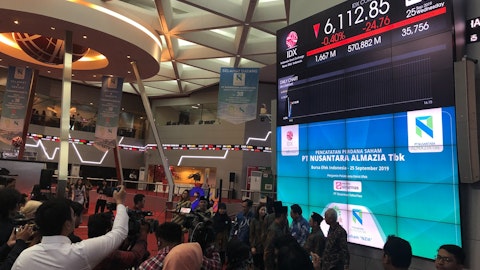Bryan Bergin: Okay. Understood. Thank you.
Operator: Thank you. One moment for our next question. Our next question comes from the line of Maggie Nolan of William Blair. Maggie, your line is now open.
Maggie Nolan: Thank you. So it sounds like the recovery trajectory in marketing analytics is still a little difficult to predict and uncertain, which I can definitely appreciate. But what about just kind of where you stand in terms of the amount of pressure that you’re seeing. Are you expecting maybe incremental pressure? Or do you see any signs of stabilization even though a recovery is still uncertain at this point?
Rohit Kapoor: Sure, Maggie. So first of all, just a bit of color. For us, marketing analytics declined quarter-on-quarter. So Q3 revenue from marketing analytics was lower than our revenue from marketing analytics in Q2. But as we have shared with you previously, we have won a number of deals in other industry verticals for marketing analytics, particularly around healthcare. So we’re going to see how that plays out in Q4, and that will give us a good sense of how that recovery will shape up going forward into ’24.
Maggie Nolan: Okay. Thank you. And then you were — when you were speaking about Dublin, you mentioned that this could be a hub for additional geographic expansion. Could you elaborate on that a little bit, maybe what you’re expecting over the next several years as you think about your geographic mix and where could be areas of growth or drivers for the business?
Rohit Kapoor: Absolutely. So for us, first of all, our business in the UK has been growing very, very nicely and the percentage contribution of total revenue from that market has been increasing over the last couple of quarters, and we’re very pleased with the progress that we are making out there. Number two, with the setting up of the office in Dublin, Ireland, it actually will open up the market for us in Continental Europe and across the EU. So we think we’ll have an opportunity to be able to access talent, access customers and be able to leverage our IP across the continent. And it’s a very strategically important decision for us to be able to expand in Europe and actually diversify our revenue base across the world. So this is something which we are very excited about. It’s a conscious and a deliberate investment that we are making, and we hope that it will play out nicely over the next couple of years.
Maggie Nolan: Very good. Thank you very much.
Operator: Thank you. One moment for our next question. Our next question comes from the line of Ashwin Shirvaikar from Citi. Go ahead.
Ashwin Shirvaikar: Hi, thank you and good morning. I wanted to sort of maybe get a more granular look into digital ops. As I sort of look at Insurance, you keep showing sequential growth. Good trends there. The Healthcare business is — it’s sort of sequentially static for a couple of quarters, same thing with the Emerging part of it. If you could provide more color on what’s underlying those two pieces? And any kind of a breakout you could provide with regards to Emerging, that helps us from a forward modeling perspective would be great. Thanks.
Rohit Kapoor: Sure. So, Ashwin, the first thing is that our Digital Operations & Solutions business is actually performing really, really well. And we think the big reason for that is, number one, the demand for client seeking, cost efficiency and productivity gains has improved in this environment, and clients are looking at aggressively managing their cost structure and getting more efficiency and operational efficiency into that process and business. We have seen that increase the pipeline, and we have seen that our strategy of combining data, digital, AI and domain is resonating very well. So our win rates have gone up and the deal sizes that we are winning, that has gone up. So frankly, these are all reasons why the Digital Operations & Solution business is actually growing very nicely for us.



